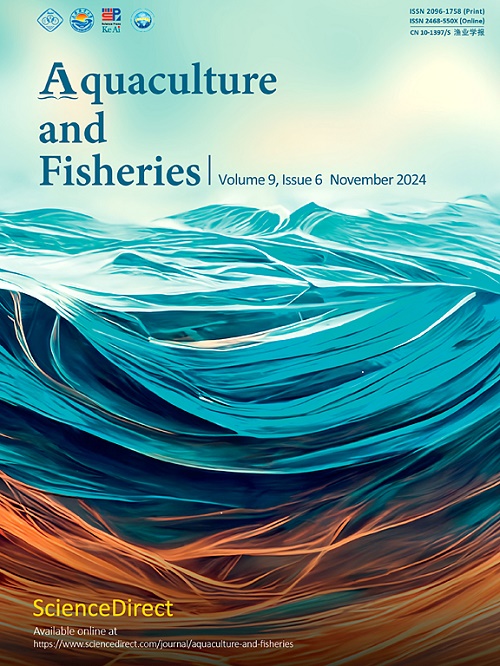急性温度应激对大口黑鲈能量代谢、免疫性能和肠道菌群的影响
Q1 Agricultural and Biological Sciences
引用次数: 0
摘要
极端天气事件的频繁发生,特别是严重的温度波动,严重损害了鱼类的生长和健康,并对水产养殖生产造成不利影响。尽管人们认识到温度在水产养殖中起着至关重要的作用,但目前还没有足够的研究来评估极端温度波动对鱼类健康的影响。为此,我们通过将水温升高或降低8°C,然后逐渐恢复到初始温度(22°C),设置急性增温组(AW)和冷却组(AC),研究对大口黑鲈能量代谢、免疫功能和肠道菌群的适应性调节。鱼的抗氧化系统响应帮助它们适应环境:两组均表现出血清超氧化物歧化酶(SOD)和过氧化氢酶(CAT)分泌的激活,血清总抗氧化能力(T-AOC)显著增加(P <;0.05)。采用不同的代谢策略来应对突然的环境扰动:在经历温度下降(AC1)后,大口黑鲈表现出血清甘油三酯(TG)和胆固醇(CHOL)水平的显著增加(P <;0.05),同时血糖水平降低(P <;0.05)。然而,急性升温期(AW1)后血清TG和CHOL水平明显降低(P <;0.05)。体温恢复后,两组均表现出正常能量代谢(CON)的趋势。与AW组相比,AC组显著影响了大口黑鲈的免疫功能:当温度急剧下降时,碱性磷酸酶(AKP)、天冬氨酸转氨酶(AST)和丙氨酸转氨酶(ALT)显著升高,溶菌酶(LZM)显著降低(P <;0.05)。温度波动后,大口黑鲈的肠道形态和微生物群发生了明显变化。利用KEGG数据库进行的微生物功能分析显示,微生物生物学功能发生了明显的变化,特别是在冷却波动(AC)期间。结果表明,剧烈的气候变化,特别是极端寒冷,可能对大口黑鲈的健康和福利不利。本文章由计算机程序翻译,如有差异,请以英文原文为准。
Effect of acute temperature stress on energy metabolism, immune performance and gut microbiome of largemouth bass (Micropterus salmoides)
Frequent occurrences of extreme weather events, particularly severe temperature fluctuations, have significantly impaired the growth and health of fish and resulted in detrimental impacts on aquaculture production. Despite recognition of the crucial role that temperature plays in aquaculture, there is currently inadequate research to assess the consequences of extreme temperature fluctuations on fish health. Hence, we set up acute warming (AW) and cooling groups (AC) by increasing or decreasing water temperature by 8 °C and then gradually restoring the initial temperature (22 °C), to investigate the adaptive regulation of energy metabolism, immune function, and gut microbiota in largemouth bass (Micropterus salmoides). The fish antioxidant system responded to assist their environmental adaptation: both groups showed activation of serum superoxide dismutase (SOD) and catalase (CAT) secretion, and a significant increase in serum total antioxidant capacity (T-AOC) (P < 0.05). Distinct metabolic strategies were employed to cope with sudden environmental perturbations: upon experiencing a temperature decrease (AC1), largemouth bass exhibited a significant increase in serum triglyceride (TG) and cholesterol (CHOL) levels (P < 0.05), coupled with a reduction in blood glucose levels (P < 0.05). However, a considerable reduction in serum TG and CHOL levels was observed after acute warming stage (AW1) (P < 0.05). Following the recovery of temperature, both groups demonstrated a tendency towards normal energy metabolism (CON). Compared to the AW group, the immune function of largemouth bass in the AC group was dramatically affected: alkaline phosphatase (AKP), aspartate transaminase (AST), and alanine transaminase (ALT) increased significantly, while lysozyme (LZM) decreased significantly when the temperature dropped sharply (P < 0.05). After the temperature fluctuations, there were apparent changes in the gut morphology and microbiota of largemouth bass. Microbial functional analysis using the KEGG database revealed apparent alterations in microbial biological functions, especially during the cooling fluctuation (AC). The results indicated that dramatic weather changes, particularly extreme cold, may be detrimental to the health and welfare of largemouth bass.
求助全文
通过发布文献求助,成功后即可免费获取论文全文。
去求助
来源期刊

Aquaculture and Fisheries
Agricultural and Biological Sciences-Aquatic Science
CiteScore
7.50
自引率
0.00%
发文量
54
审稿时长
48 days
期刊介绍:
 求助内容:
求助内容: 应助结果提醒方式:
应助结果提醒方式:


